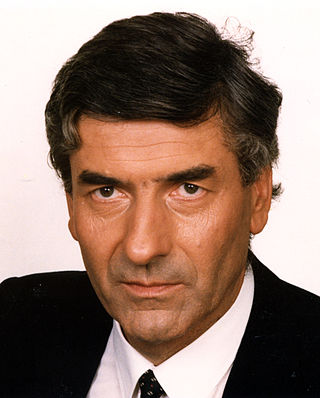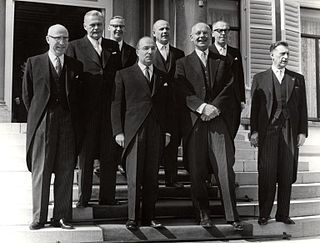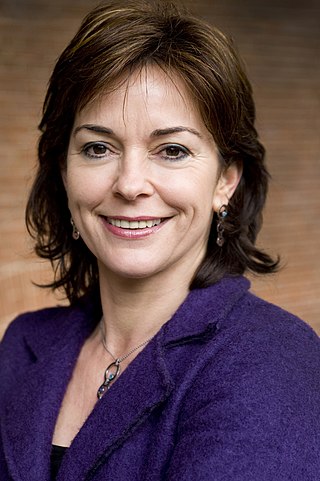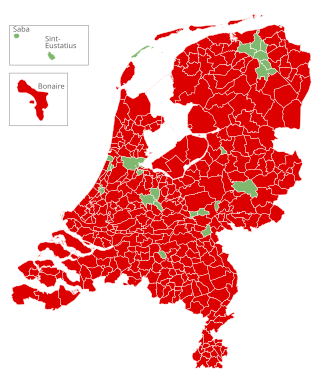
Rudolphus Franciscus Marie "Ruud" Lubbers was a Dutch politician, diplomat and businessman who served as Prime Minister of the Netherlands from 1982 to 1994, and as United Nations High Commissioner for Refugees from 2001 to 2005. He was a member of the Catholic People's Party (KVP), which later merged to become the Christian Democratic Appeal (CDA) party.
GroenLinks is a green political party in the Netherlands.

Markelo is a village in the Dutch province of Overijssel. It is located in the municipality of Hof van Twente, about 20 km (12 mi) west of Hengelo and 20 km (12 mi) south-west of Almelo.

Femke Halsema is a Dutch politician and filmmaker. On 27 June 2018, she was appointed Mayor of Amsterdam and she began serving a six-year term on 12 July 2018. She is the first woman to hold the position on a non-interim basis. She previously was a member of the House of Representatives for the leftist green party, GroenLinks from 1998 to 2011, and served as the party's parliamentary leader from 2002 to 2010.

The Royal Netherlands Army is the land branch of the Netherlands Armed Forces. Though the Royal Netherlands Army was raised on 9 January 1814, its origins date back to 1572, when the Staatse Leger was raised making the Dutch standing army one of the oldest in the world. It fought in the Napoleonic Wars, World War II, the Indonesian War of Independence and the Korean War, as well as served with NATO on the Cold War frontiers in West Germany from the 1950s to the 1990s.

Kathalijne Maria Buitenweg is a Dutch politician for the GreenLeft who served as a member of the House of Representatives between 2017 and 2021. Between 1999 and 2009, she was a Member of the European Parliament, and sat on the European Parliament's Committee on Civil Liberties, Justice and Home Affairs. In 2019 she was exposed as one of the members of the secret Bilderberg meeting.

Diederik Maarten Samsom is a Dutch environmentalist and retired politician who was the leader of the Labour Party from 2012 to 2016. He was the first leader in the 70-year history of the PvdA to have been voted out of his position by party members. He later served as head of cabinet for First Vice-President of the European Commission Frans Timmermans and his successor Wopke Hoekstra.

Ramses Shaffy was a Dutch-French singer and actor who became popular during the 1960s. His most famous songs include "Zing, vecht, huil, bid, lach, werk en bewonder", "We zullen doorgaan", "Pastorale", "Sammy" and "Laat me". He frequently collaborated with Dutch singer Liesbeth List.

The Cals cabinet was the executive branch of the Dutch Government from 14 April 1965 until 22 November 1966. The cabinet was formed by the christian-democratic Catholic People's Party (KVP) and Anti-Revolutionary Party (ARP) and the social-democratic Labour Party (PvdA) after the fall of the previous Cabinet Marijnen. The cabinet was a Centre-left coalition and had a substantial majority in the House of Representatives; prominent Catholic politician Jo Cals, a former Minister of Education, served as Prime Minister. Labour Leader Anne Vondeling served as Deputy Prime Minister and Minister of Finance, Protestant Leader Barend Biesheuvel continued as Deputy Prime Minister, Minister of Agriculture and Fisheries and the responsibility for Suriname and Netherlands Antilles Affairs from previous cabinet.

Johanna Catharina Maria "Jolande" Sap is a former Dutch politician and former educator and civil servant. A member of GroenLinks (GL), she replaced Wijnand Duyvendak as a member of the House of Representatives on 3 September 2008, after his resignation. She had temporarily been replacing Mariko Peters from the previous day who was on parental leave. From 16 December 2010 to 5 October 2012 she was party leader as well as parliamentary leader in the House of Representatives, replacing Femke Halsema who announced her retirement from politics as of that date.

Mohamed Rabbae was a Moroccan-born Dutch politician and activist.

Major Marinus Johannes "Marco" Kroon, RMWO, is a Dutch officer serving with the Korps Commandotroepen. Kroon is one of only three living knights 4th class of the Military Order of William and the first new member appointed to this Dutch Order in over half a century. The Military William Order is the highest honour in the Netherlands, bestowed for "performing excellent acts of Bravery, Leadership and Loyalty in battle".

Bas Eickhout is a Dutch politician who has been a Member of the European Parliament (MEP) since the 2009 elections. He is a member of the GreenLeft, part of the European Green Party.
Uitgeverij Prometheus is a Dutch publishing company whose main focus is on literature, history and language. It was founded by Mai Spijkers in 1989. Bert Bakker is a notable imprint of Prometheus.
René Roemersma was a Dutch activist and leader of the Dutch terror group Revolutionary Anti-Racist Action (RaRa). Roemersma was the only convicted RaRa activist.

The Korps Commandotroepen (KCT) is the elite special forces unit of the Royal Netherlands Army. The KCT traces its origins to the Second World War with the founding of No. 2 (Dutch) Troop, and the founding of the Korps Speciale Troepen during the Indonesian War of Independence. At present, the unit is tasked with conducting the full spectrum of special operations, its principal tasks being direct action, special reconnaissance, military assistance and counter-terrorism.

In the Netherlands, from the entry into force of the Advisory Referendum Act on 1 July 2015, until its repeal on 18 February 2018, most types of primary laws could be subjected to a suspensory, non-binding referendum if requested shortly after royal assent and subsequent proclamation. If a law was rejected by more than half of the votes cast, with a mandatory turnout of at least 30%, its entry into force was to be suspended indefinitely and a follow-up law had to be enacted that either repealed the law or provided for its entry into force.

An advisory referendum on the approval of the Ukraine–European Union Association Agreement was held in the Netherlands on 6 April 2016. The referendum question was: "Are you for or against the Approval Act of the Association Agreement between the European Union and Ukraine?"

Remi Jean Louis Poppe is a former Dutch politician and environmental activist. He was a member of the House of Representatives from 1994 to 2002 and again from 2006 to 2010 on behalf of the Socialist Party (SP).
















